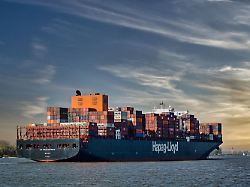Because of Houthi attacks
Hapag-Lloyd offers an alternative route through Saudi Arabia
January 22, 2024, 3:16 p.m
Listen to article
This audio version was artificially generated. More info | Send feedback
The major shipping companies are currently avoiding the route through the Red Sea. Instead, the ships travel around the southern tip of Africa – a time-consuming and expensive detour. But the alternative route through Saudi Arabia also has its pitfalls.
In view of the ongoing tense situation in the Red Sea, Hapag-Lloyd is offering its customers a transit service across Saudi Arabia. According to a message published online to customers, land transport corridors will connect three ports on the Persian Gulf with the port of Jeddah on the Red Sea.
Jeddah lies about halfway between the Bab al-Mandab Strait off Yemen, from where Houthis have attacked ships, and the Suez Canal. Meanwhile, Hapag-Lloyd continues to avoid the maritime area in the Middle East and reroute its ships around the Cape of Good Hope at the southern tip of Africa. This applies until further notice, explained a spokesman.
With the transit through Saudi Arabia, Hapag-Lloyd is offering a “convenient emergency solution” until the situation in the Red Sea normalizes, the world’s fifth largest shipping company based in Hamburg wrote to its customers. In the Persian Gulf, the transshipment points involved are Al-Jubail and Dammam in Saudi Arabia and the port of Jebel Ali in Dubai.
Hapag-Lloyd also regularly carries out the so-called intermodal business, in which goods are brought further inland from the ports by road or rail. According to its own information, Germany’s largest container shipping company has 55 ports and 53 inland terminals in the Middle East region.
Ships are being diverted
The land transport corridors are not the optimal solution in terms of capacity, Hapag-Lloyd continued in the customer note. But overland routes offer another option for transportation, especially when other alternative routes become too long.
Hapag-Lloyd – like other major shipping companies – has not sent ships through the Red Sea and the Suez Canal for weeks, but has instead rerouted them around the southern tip of Africa. This leads to delays, higher costs and fees. The usual route via the Red Sea, the Suez Canal and the Mediterranean is the shortest shipping connection between Southeast Asia and Europe.
Most recently, Hapag-Lloyd decided every week whether it would continue to bypass the area. However, it was now said that the diversion regulations would now apply until further notice. Developments on site are continuously monitored. “As soon as the situation changes and it is safe again, we will direct our ships through the Red Sea and the Suez Canal.”
In Yemen, the Houthis have declared solidarity with the terrorist organization Hamas in the Gaza Strip and have repeatedly attacked ships off the coast they control. A Hapag-Lloyd ship was also attacked on December 15th. According to insiders, it is now becoming apparent that EU states want to participate in military protection of shipping in the Red Sea.
